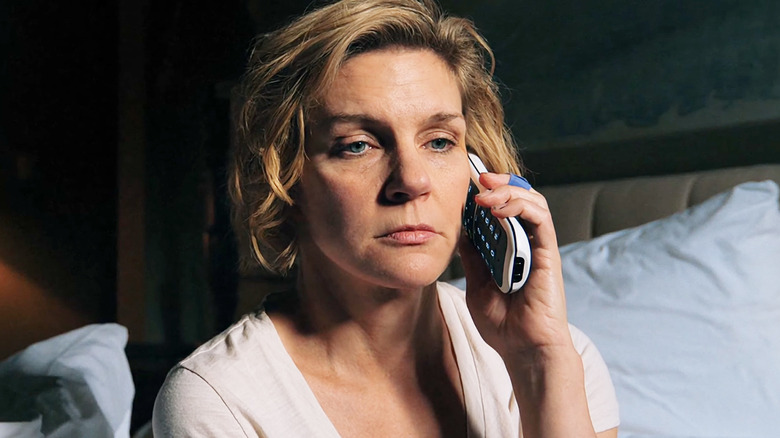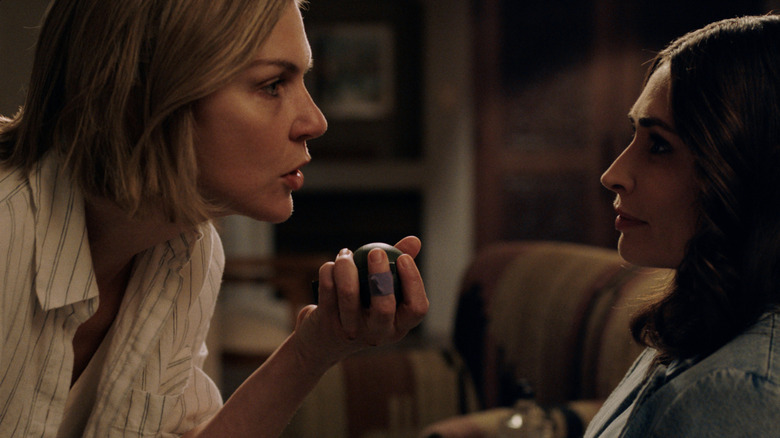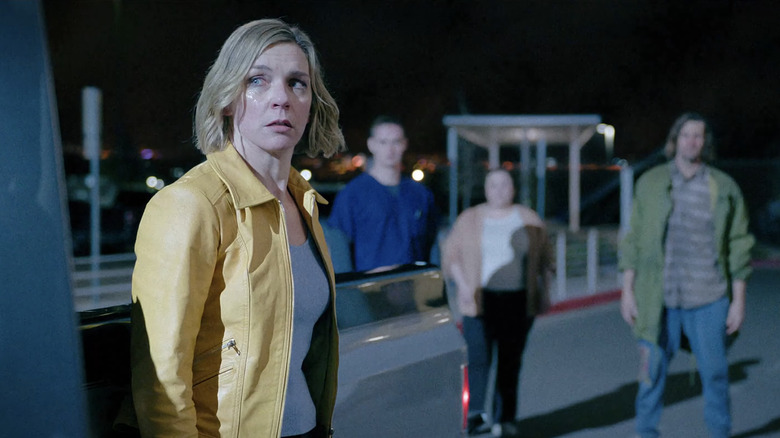Apple TV's Pluribus Becomes 'Useless' If One Thing Is Revealed, According To A Writer
"Pluribus," is a superb and intriguingly peculiar sci-fi series full of mysteries. Those mysteries go beyond the central enigma surrounding the virus which transforms people into sedate drones. The Apple TV show, from "Breaking Bad" and "Better Call Saul" creator Vince Gilligan, seems to have a lot to say about our modern times but exactly what its point of view actually is remains elusive even several episodes into the debut season. According to one "Pluribus" writer, that's all by design, as revealing what the show is trying to say — if anything — would render it entirely pointless.
"Pluribus" follows romantasy author Carol Sturka, who after the world is plunged into chaos discovers she's one of a small group of people immune to the effects of a mysterious virus that otherwise transmogrifies individuals into walking avatars for some sort of extra-terrestrial hive mind entity. At least, we think it's extra-terrestrial. Things aren't entirely clear at the outset, which gives fans plenty of room to develop their own theories about what the heck is going on in "Pluribus."
But outside of that central mystery, there's also the question of what the new series is trying to say. What's the subtext here? Is it all some carefully constructed allegory? If so, for what? Well, according to writer, director, and executive producer Gordon Smith, there'll be no audience hand-holding on that front. In an interview with The Hollywood Reporter, Smith said that defining the series' deeper meaning limits its storytelling power and prevents people from finding their own meaning in the narrative.
Explaining Pluribus renders the show useless
We already know "Pluribus" won't have the type of twist many fans are expecting, which means despite the fact the Apple TV series is the latest secret remake of sci-fi classic "Invasion of the Body Snatchers," we won't be seeing Rhea Seehorn's Carol Sturka suddenly transformed into one of the oddly serene minions created by the virus. What's more, creator Vince Gilligan has played down the idea of the virus itself being a mystery, saying that fans who saw the series premiere may well have all the information they need to figure things out.
That just leaves the other big question hanging over the series then — what are Gilligan and his writers trying to say? In his THR interview, Gordon Smith acknowledged that there are some prominent and timely themes in "Pluribus" but stopped short of explaining exactly what the show's perspective on them. "It's less rich to say, 'Oh, this is a show about fill-in-the-blank," he said. "If I said that it's a metaphor about not using your phone, you don't need to watch the show. The show becomes useless. The show becomes meaningless."
Many may have noticed the anti-AI statement in the "Pluribus" credits, which states plainly that the show is "made by humans." As such, you can very easily read the show as one big polemic against artificial intelligence. But according to Smith, that would be limiting the scope of the series' appeal. "There are AI proponents that are going to watch the show, and they might feel attacked or they might feel supported," he said. "But for us to say, 'No, it should just be this one-to-one correspondence,' it limits both the storytelling and the availability of the show to ask questions that people are going to be interested in."
Pluribus is a Rorschach test for viewers
When "Pluribus" begins, Carol Sturka hosts a live reading event for her latest novel "Bloodsong of Wycaro" (a chapter of which is available for real-world fans to read as Apple follows a marketing strategy set up by "Severance"). At the event, Sturka is approached by readers whose fanatical love for her novels seems to irk the author. Soon after, she complains to her manager and partner Helen L. Umstead (Miriam Shor) about her work, which she feels lacks artistic integrity. Helen then reassures her by pointing out how her books mean something to readers, and that making people happy is important. Immediately, then, you get the sense the show is exploring the meaning of art and the tension between it and entertainment — a timely subject given our modern media landscape, as exemplified by the discourse surrounding Marvel movies vs. "cinema."
Then, Carol is confronted by a global population of unctuous drones that seem to negate Helen's argument about making people content. Either Carol will be forced to confront her own misanthropy as a result of essentially losing her fellow humans to the hive mind, or be vindicated in her initial view that art is more important than merely keeping people content with escapism. Then, the show throws us for a loop by presenting the idea that these placid human stand-ins might actually be a positive thing since they basically herald the arrival of world peace.
So what's the deal? What is this show about? We'll have to keep watching to find out but as Gordon Smith said, simply explaining the subtext would make further viewing pointless. "This is such a conceptual show," he said, "and my hope is that it makes people think about and feel different things in different ways."


